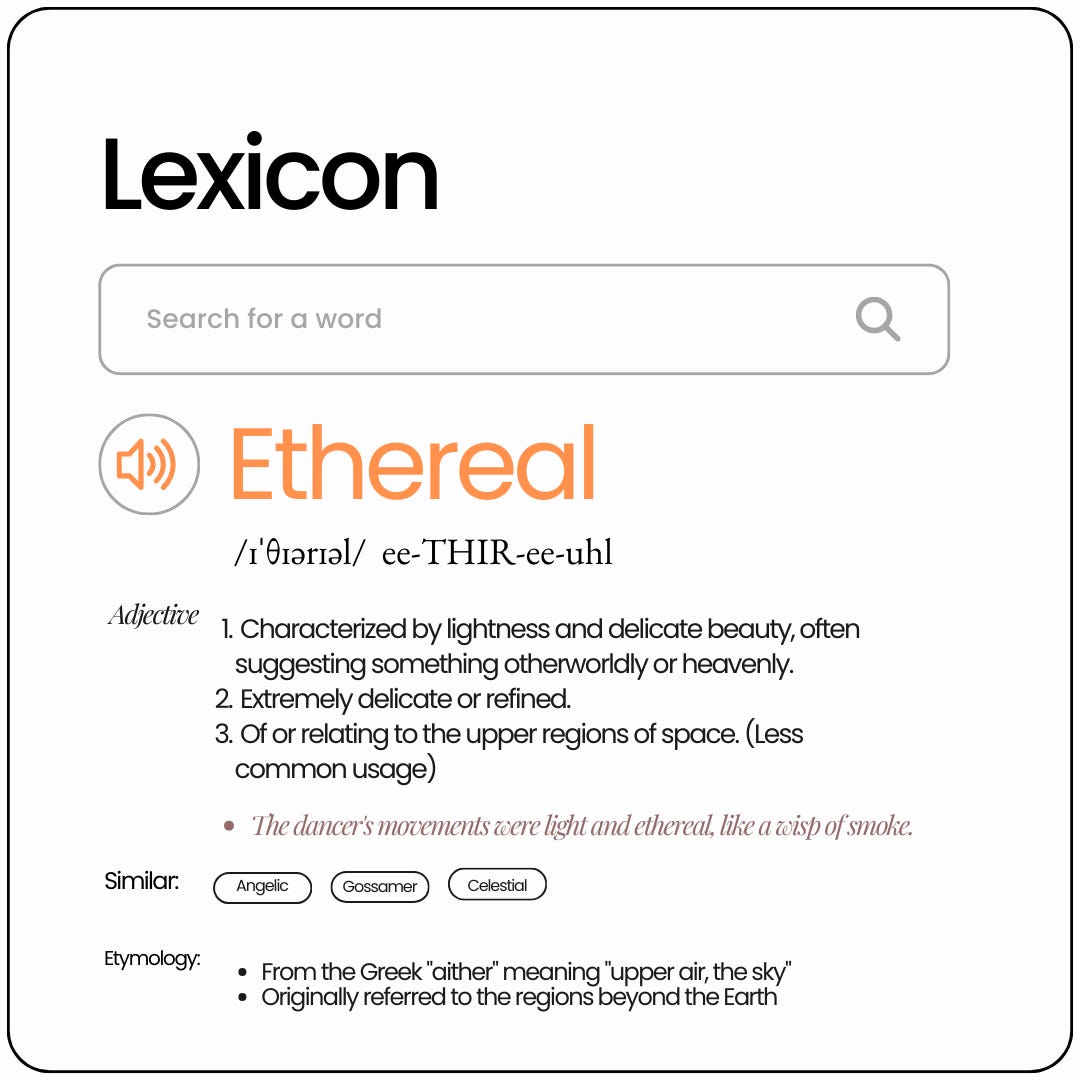Unveiling the Ethereal: A Word That Touches the Heavens!
Uncover "Ethereal" & its celestial origins.
Greetings, Logophiles!
Last time, we reveled in the beauty of "Pulchritudinous," a word that captured the essence of physical splendor. Today, we embark on a journey to a different realm of beauty – the ethereal!
Word of the Day: Ethereal (ee-THIR-ee-uhl)
Part of Speech: Adjective
Definition: Light, delicate, and seemingly not of this world; heavenly or celestial.
Origin Story: The word "ethereal" takes us on a captivating adventure through time and language. It all begins with the ancient Greek word "aither," which referred to the upper atmosphere, the clear blue expanse beyond the clouds. Imagine the Greeks gazing up at the heavens, filled with awe at the vastness and purity above. This concept of the "aither" eventually found its way into Latin as "aether," retaining its celestial association. Fast forward to the 14th century, and "aether" embarks on a transformation in Middle English, emerging as our present-day "ethereal." This delightful word carries the essence of the heavens, the lightness and delicate beauty associated with the upper realms.
How to Use It:
Evoking a Dreamlike Quality: "The ballerina's movements were ethereal, as if she floated across the stage."
Describing Delicate Beauty: "The gown was crafted from ethereal silk, shimmering like moonlight."
Capturing Otherworldly Beauty: "The mountain peaks pierced the ethereal clouds, a sight that took my breath away."
Figurative Speech: "Her voice had an ethereal quality, both soothing and strangely powerful."
The Alchemist's Experiment:
Yesterday's Challenge: Masticate the Meaning
One of the answers to finding a synonym for "pulchritudinous" was indeed "beautiful." Here's a reminder of the original sentence: "The palace garden was filled with pulchritudinous flowers." You could rewrite the sentence as: "The palace garden was filled with beautiful flowers. Did you find the other synonyms?
Today's Experiment: Two-Truth & a Tautology
Test your knowledge of "ethereal"! Two of the following statements about "ethereal" are true, and one is a tautology (a redundant phrase). Can you spot the tautology? Share your answers in the comments!
Statement 1: The word "ethereal" is derived from a Greek word meaning "upper air."
Statement 2: Ethereal can be used to describe something beautiful even if it's not delicate or light.
Statement 3: Ethereal is often used to describe things that seem out of this world.
Fun Facts:
The element ether was once believed to fill the space above the Earth's atmosphere. While the scientific concept of ether has been debunked, the word "ethereal" continues to capture the essence of the heavenly realms.
Ethereal beings are common characters in mythology and fantasy, often depicted as creatures of light and extraordinary beauty.
Bonus Word: Elysian (i-LIH-si-uhn) - Delightfully peaceful and idyllic; resembling heaven or paradise.
Hint for Tomorrow: Our next word evokes a sense of mystery and spiritual awe. It hints at a power that transcends the physical world.
So, Logophiles, let the ethereal inspire you! Share your favorite uses of "ethereal" or describe something in your world that embodies this otherworldly beauty in the comments below.
Happy reading,
The Inkwell Alchemist





